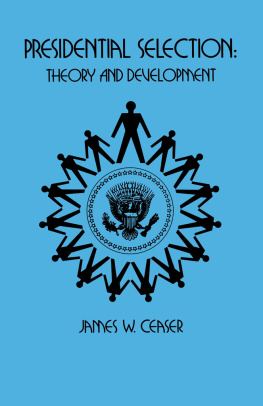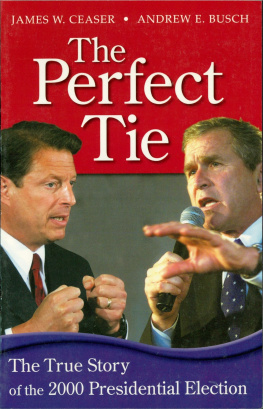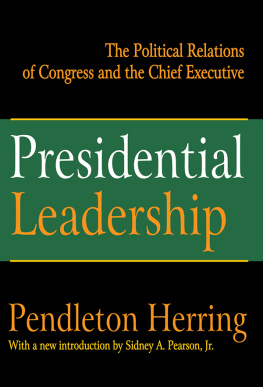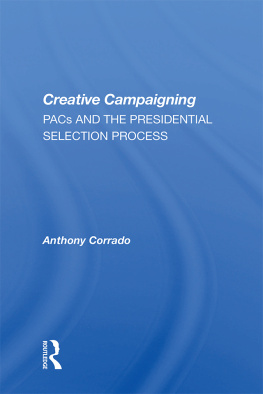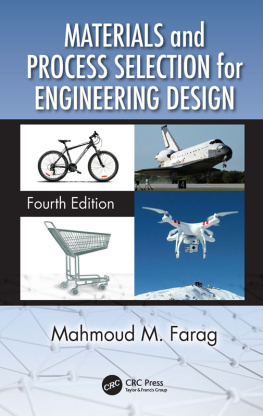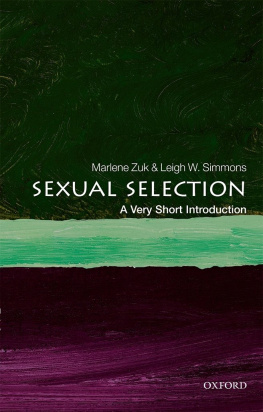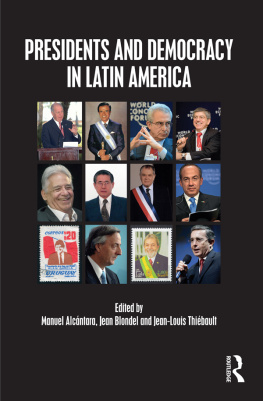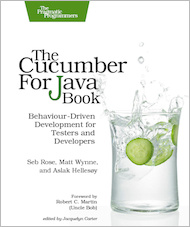Copyright 1979 by Princeton University Press
Published by Princeton University Press, Princeton, New Jersey In the United Kingdom: Princeton University Press, Chichester, West Sussex
ALL RIGHTS RESERVED
Library of Congress Cataloging-in-Publication Data
Ceaser, James W.
Presidential selection.
Based on the authors thesis, Harvard, 1977.
Bibliography: p.
Includes index.
1. PresidentsUnited StatesElectionHistory.
2. PresidentsUnited StatesNominationHistory.
3. Political scienceUnited StatesHistory. I. Title
JK524.C4 329.00973 78-70282
ISBN 0-691-07602-2
ISBN 0-691-02188-0 (pbk.)
eISBN: 978-0-691-21590-7
https://press.princeton.edu/
R0
The same ambition can destroy or save,
And makes a patriot as it makes a knave.
ALEXANDER POPE,
An Essay on Man
PREFACE
CONTEMPORARY scholarship on the presidential selection process has almost entirely ignored the thought of Americas past statesmen and political theorists. The absence of what one might call a traditional approach to the study of presidential selection can be traced primarily to the extra-Constitutional status of most aspects of the current selection system. While the operations of the presidency and the Congress are still controlled in many crucial respects by the Constitution, the basic features of the selection processincluding popular elections, parties, conventions, and campaignsdeveloped outside of, and largely in opposition to, the original Constitutional design. As a result, students of the selection process, unlike many of those studying our other institutions, have seen no need to consult the ideas of the Founders. Nor have they felt that any body of thought on the selection process since the Founding deserves serious consideration. In this they have followed the dominant view of party historians, who until very recently taught that the development of parties and the selection process was a product not of a conscious design of certain statesmen to fashion constitutional doctrine but rather of a search by pragmatic politicians for the most effective way to win power.
The study of the presidential selection system has thus been left to the domain of modern scholars without the assistance or constraint of any classical American conceptions of its purpose. This freedom from tradition has led to a kind of scholarly license, with nearly as many approaches to the topic as the number of scholars writing in the field. While some studies have produced valuable insights, it is apparent that the field lacks an approach that defines the basic elements of the selection process, indicates the relationship among them, and establishes criteria by which to judge proposals for change.
These deficiencies were apparent to anyone who compared the recent debates on the reform of the selection system with those on the scope of executive power. The contrast was striking: here were two areas of institutional analysis, both constitutional in the sense that they involved fundamental aspects of our political system, which were treated in entirely different ways. The debate on the presidency was informed by classical views of the nature of executive power and as it proceeded seemed to promote a deeper understanding of the issues. The debate on selection, on the other hand, developed without reference to past ideas and often degenerated into unreflective declamations in favor of or against direct democracy, as if this were the only value that merited consideration.
The dissatisfaction I felt with the quality of this debate and with some of the institutional changes that resulted from it led me to go back to the works of earlier American thinkers in search of a broader approach to the study of presidential selection. I was under no illusion that these sources could furnish immediate solutions to todays problems or even that they could offer the kind of direct guidance they sometimes provide in the case of questions relating to our other institutions. But I was hopeful, and soon became convinced, that traditional thought in this area could at least help to identify the range of issues necessary for any comprehensive treatment of the selection problem.
The goal, accordingly, that I have set for myself in this study is to integrate contemporary institutional analysis of the selection process with the relevant themes of American political thought. In attempting to combine what are now considered two distinct fields, I am aware that I will be addressing two different audiences. To those in the field of American political thought, this study offers a discussion of the ideas of four major thinkers on the question of presidential selection: the Founders, Thomas Jefferson, Martin Van Buren, and Woodrow Wilson. I intend to show not only that these thinkers gave the issue of selection a great deal of attention, but further that their ideas decisively shaped the development of the selection system. To those in the field of contemporary political parties and electoral politics, this study presents an account of the recent changes in the selection process and an analysis of their implications for the structure of political parties and for the nature of presidential leadership and executive power. It is my basic intention, however, not to address each of these audiences separately, but both together. The study of past political thought is designed to elucidate a perspective on the presidential selection process that can be used to analyze contemporary problems, while the discussion of contemporary problems serves to illustrate many of the difficulties that concerned past thinkers.
One final comment. This book concludes with a prescription for modern politicsa call for the reinstitution of strong electoral parties for the purposes of providing an informal check on the president and restraining the leadership appeals of presidential aspirants. This prescription represents what is admittedly a personal judgment about the most profound themes within the tradition of American political thought, and I have therefore tried to separate the analysis of past thinkers from the conclusions I ultimately draw. Some will certainly challenge these conclusions; my hope, however, is that they will not dismiss the sources from which they are taken, but will attempt to use these same sources to build a case for a different set of recommendations.
ACKNOWLEDGMENTS
THIS book grew out of my doctoral dissertation at Harvard University, and I would like to express my gratitude to my thesis advisors, James Q. Wilson and William Schneider, who gave so freely of their time, advice, and encouragement while I was writing and revising the manuscript. Arthur Maass read my original introduction and with his usual firmness and kindness helped me to rethink my basic objectives. My friend and former colleague at Kenyon College, Phil Marcus, read the manuscript in its entirety and made many suggestions which I incorporated into the book; his wife, Sally, handled the typing and to my great relief took the liberty of doing a substantial amount of editing. The book touches on a wide range of topics in American political thought and electoral behavior, and I could never have undertaken so extensive a project without the excellent background I received in these two areas from my teachers Robert Horwitz, Harry Clor, Harvey C. Mansfield, Jr., H. Douglas Price, and Walter Dean Burnham.
In revising the manuscript, I was fortunate to have the help of three excellent readers supplied by Princeton University Press: Hugh Heclo, Robert Nakamura, and the late Herbert Storing. Each offered valuable suggestions which I tried to take into account in my second writing. Just before his death, Professor Storing joined the faculty at the University of Virginia and in the very brief time that we were colleagues assisted me with many points in the early chapters. Two graduate students at Virginia, Jeffrey Mason and Stephanie Feazel, helped with proofreading and the preparation of an index. The Earhart Foundation and the University of Virginia kindly supplied me with financial assistance during the summers of 1976 and 1977.

